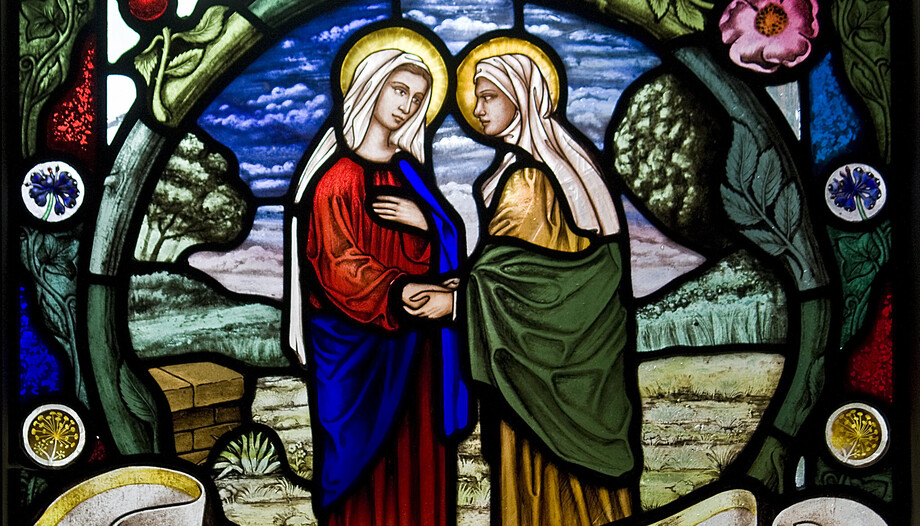As we can read below, the theme of going out to meet Christ continues to be strongly present in this part of Advent:
"Almighty God, rich in mercy, let not earthly cares hinder us when we go forth with courage to meet your Son, so that, learning from heavenly wisdom, we may share fully in his life."
"Omnípotens et miséricors Deus, in tui occúrsum Fílii festinántes nulla ópera terréni actus impédiant, sed sapiéntiae caeléstis erudítio nos fáciat eius esse consortes."
The structure of this collect, in its Latin version, consists of a rich invocation, followed by a petition composed of two opposing parts. On the other hand, it does not have the element known as "anamnesis", a reference to a salvific action of God that is remembered, resembling in this respect the one we have already analyzed on first Sunday.
God is in a hurry, are you?
The addressee of our prayer is God the Father, but we have recourse in a special way to his Almighty Power and Mercy. After all, "God so loved the world that he gave his only begotten Son, that whoever believes in him should not perish but have eternal life. For God sent not his Son into the world to judge the world, but that the world through him might be saved" (Jn 3,16-17).
The first words of the petition ("in tui occúrsum Fílii festinántes") place us in continuity with the way the liturgy proposed to begin Advent last Sunday, that is, by going out to meet the Son of God who is coming. What is new, however, is the emphasis placed on the participle "festinántes", which conveys the idea of haste (although it has been somewhat blurred in the Spanish translation).
We have come across this word before, when studying the collections of the Lenten season (fourth Sunday). It is interesting to see the role it plays in making the faithful aware of the succession of time. After all, the weeks are passing quickly and the time we are waiting for is getting shorter and shorter.
But we cannot only consider it in its chronological sense. It also describes the attitude of the Virgin when she goes to visit her cousin Elizabeth (Lk 1:39) and the attitude of the shepherds who approach Bethlehem looking for the Child after the announcement of the angels (Lk 2:16). Therefore, it also intends to portray the interior attitude of the faithful, who are called to give greater priority to living their faith, to the encounter with the mystery of God.
Only in the Collect of the morning Mass on December 24 does the Church dare to ask this haste of God himself, rather than of her faithful: "Make haste, Lord Jesus, we ask you, do not delay". It is very surprising how confident we can be as a Church to address God with a request that sounds almost like a demand. But, evidently, if anyone is in a hurry to love, to give himself, it is God.
The divine ways of the earth have been opened.
As the first part of the petition points out, the Christian's prompt response to God's love encounters possible opposition in earthly concerns ("actus terreni"). Therefore, we ask for help so that they will not be an impediment to our will to go out to meet the Lord. These "earthly" concerns can remind us of the different "types of soil" on which the seed falls, according to another well-known parable of Jesus (Mt 13). That is to say, the different possible responses to the Word of God and the different fruit that it bears in the life of each person.
But we should not think of abandoning our daily occupations in order to generate a spiritual life parallel to the daily realities in which we have to occupy ourselves. The Incarnation of Christ, his hidden life in Nazareth and his work, show us that the problem is not in the materiality of these actions (which in themselves do not prevent us from encountering God) but in our lack of the Spirit of Jesus, capable of turning every moment into a dialogue with his Father and every act into a demonstration of obedience and love.
Therefore, what we oppose to this possible lack is the heavenly wisdom ("sapientiae caelestis eruditio") with which we wish to fill ourselves. If we allow ourselves to be instructed by the Spirit of Wisdom and apply it to the ordinary life in which God Himself has placed us, we will succeed in turning it into a path of holiness that will make us coheirs (spouses) together with the Son. Advent is, then, a time of spiritual enrichment and a new call to hasten the pace. All Christians who live and work in the midst of the world are called to convert their daily achievements into works that are valuable in the eyes of God. As St. Josemaría taught: "There is something holy, something divine, hidden in the most ordinary situations, which it is up to each one of you to discover" (Homily "Passionately Loving the World").
Priest from Peru. Liturgist.







